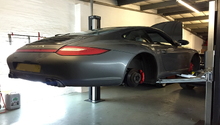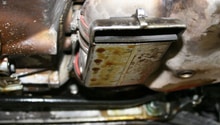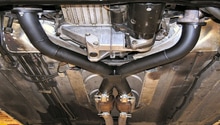Porsche 993: Why is a Burning Smell Coming Out of My Car?
10/10 mechanics agree that if your 993 smells like something is burning, then something is burning. Fortunately for the air-cooled owners, it's likely something easy to diagnose and get taken care of.
This article applies to the Porsche 993 (1993-1998).
Any owner of an older air-cooled Porsche has come to expect that classic "Porsche Smell." Somewhere where gasoline, oil, carpet glue, and hot metal meet, there's a distinct aroma that feels so familiar, even pleasant. But sometimes it gets overpowered by something else, a bad burning smell that can be quite alarming if you don't know the possible causes.

Materials Needed
- Flashlight
- 10mm socket and ratchet
Step 1 – Try the heater
The heater in an air-cooled Porsche doesn't work the same way as in water-cooled cars. Metallic heat exchangers take heat directly from the engine and pipe it into the cabin through the vents. If you notice the smell getting stronger when you turn the heater on, that's a good indication that oil is dripping onto the heat exchangers in the engine bay.

If this is the symptom you are having, skip to Step 3.
Step 2 – Check the tires
They could be rubbing.
If you have aftermarket wheels and tires, it's possible that the size and fit isn't the same as stock. Put the car on stands, and thoroughly inspect the tires and inner wheel wells for indications of rubbing. Left unchecked, this could cause a dangerous blowout while driving. Even if your setup is stock, it's a good idea to check the tread on the tires. If there is uneven wear, it's possible that your alignment is off. If it's far enough out of whack, you could get a tire hot enough to start smelling like burning rubber.
Related Articles:
- Porsche 993: How to Jack Up Your Car - Rennlist.com
- Porsche 993: How to Check Your Tire Tread - Rennlist.com

Step 3 – Check for oil leaks
Possibly the most likely cause of a burning smell is an oil leak dripping onto the headers and burning. Different oils can create different smells, some of them closer to burning plastic or rubber. Put the car up on stands, remove the undertray, and look for sources of oil. Pay special attention to the valve covers, as these are a typical trouble area.
While you are under there, also inspect along the length of the exhaust pipes. If you picked up a piece of debris, say a plastic bag, it could get caught on the pipes and melt.

Step 4 – Check the A/C
The pump could have seized.
A major component of the A/C system is the belt-driven pump. It doesn't run all the time, utilizing an electric clutch to kick on and off. Occasionally these pumps can seize, causing the clutch to burn itself into oblivion. This will create some bad smells, and can even splatter your engine bay with melted material. Take the belt off, and remove the single 10mm bolt holding the pulley on. Behind it, you will be able to see if the clutch is in good shape or not.

Related Discussions
- Curious: Do Coupe/Targa Owners Have the Burned Oil Smell in Cabin? - Rennlist.com
- Crazy Question - Burnt Rubber Smell from Rear Wheel Wells After Driving Around - Rennlist.com
- Plastic Burning Smell? - Rennlist.com
- More Help Needed - Burning Plastic Smell & Smoke - Rennlist.com






